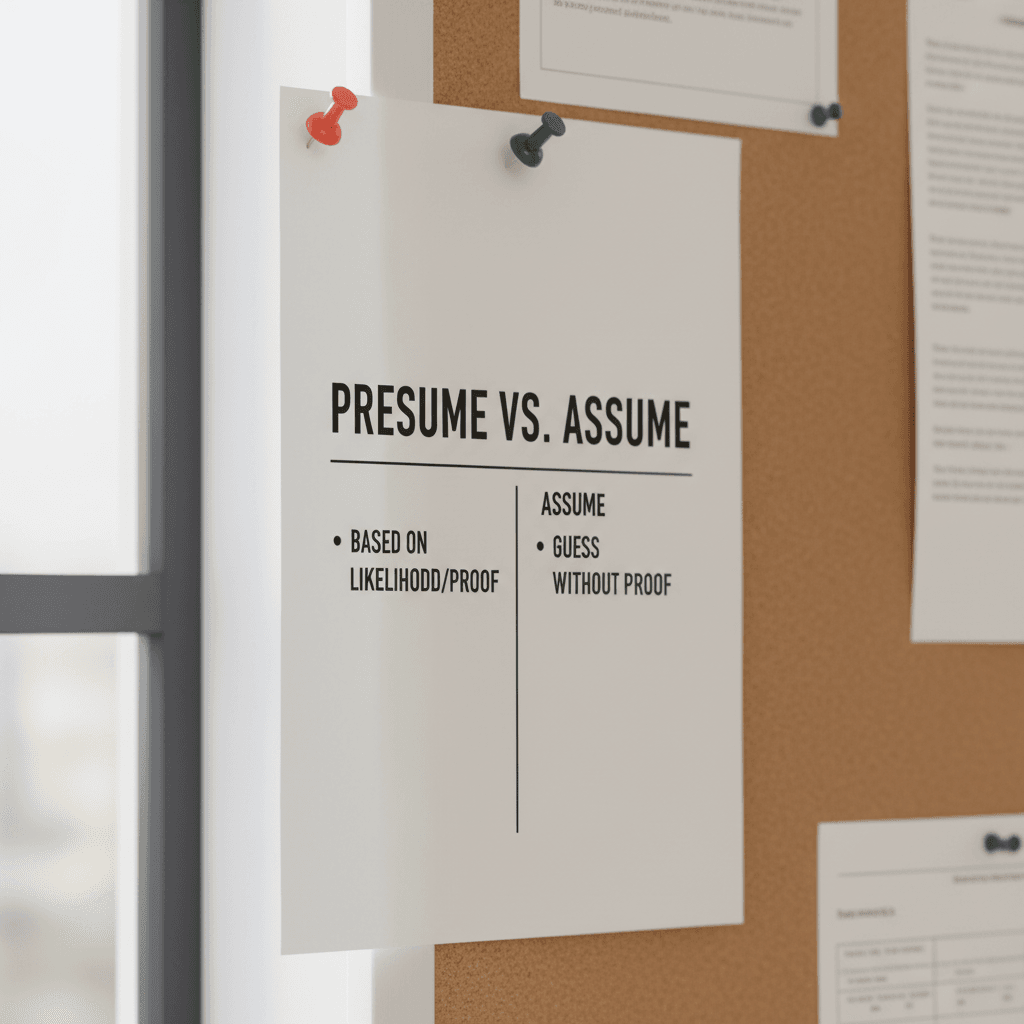Presume vs. Assume: What’s the Difference?
 Both presume and assume mean to believe something before knowing all the facts, but they differ in confidence and evidence.
Both presume and assume mean to believe something before knowing all the facts, but they differ in confidence and evidence.
- Presume = to believe something is probably true based on evidence or logic.
- Assume = to believe something is possibly true without proof.
Let’s explore the difference in depth.
Presume: Based on Probability or Evidence
Meaning
“Presume” means to believe something is true because it seems likely or logical, even if it’s not proven.
It suggests a reasonable or educated guess based on facts or behavior.
Examples (10 total)
- The police presumed he was guilty after finding evidence.
- I presume you’ve met my assistant before.
- She didn’t reply, so I presumed she wasn’t interested.
- We presume the train will be on time.
- You’re a guest here, I presume?
- The teacher presumed the students did their homework.
- It’s safe to presume they already know the rules.
- He’s late again, so I presume he missed the bus.
- Scientists presume the theory is correct until proven otherwise.
- We presumed the meeting was canceled due to the storm.
🧠 Tip:
Use presume when you have some reason or evidence to believe something.
Assume: Believing Without Evidence
Meaning
“Assume” means to accept something as true without any proof or evidence — often used when making guesses or generalizations.
It’s more casual and sometimes less accurate.
Examples (10 total)
- I assumed you were coming to the party.
- Don’t just assume she’s angry — ask her!
- He assumed I knew about the plan.
- People often assume things without asking.
- I assume you’ve finished your homework.
- She assumed he was single because he didn’t mention a partner.
- We can’t assume everyone agrees with us.
- They assumed the project would be easy.
- He assumed the keys were in his pocket.
- Never assume anything in business — always check the facts.
🧠 Tip:
Use assume when you’re guessing or taking something for granted.
Quick Comparison Table
| Word | Meaning | Based On | Example |
|---|---|---|---|
| Presume | To believe something likely or logical | Evidence or reasoning | I presume she’s at work — her car is gone. |
| Assume | To believe something without proof | No evidence | I assume she’s at work — I didn’t check. |
How to Remember the Difference
👉 Presume = Probability (You have a reason).
👉 Assume = Imagination (You just think so).
💡 Memory Trick:
“Presume” starts with pre-, like “proof.”
“Assume” starts with as-, like “a shot in the dark.”
Common Phrases
| With “Presume” | With “Assume” |
|---|---|
| Presume innocence | Assume responsibility |
| Presume dead | Assume control |
| Presume the worst | Assume the role |
| Presume consent | Assume it’s true |
Why People Confuse Them
Because both verbs mean “to believe before knowing for sure,” people often use them interchangeably.
However, presume feels more formal and evidence-based, while assume feels more casual and uncertain.
That’s why tools like Humanizey help ensure your writing uses the correct tone and nuance every time.
FAQs
1. Can “presume” and “assume” mean the same thing?
Sometimes, yes — but presume implies evidence, while assume implies guessing.
2. Which one is used in law?
“Presume.” For example, “innocent until proven guilty” means a person is presumed innocent.
3. Is “assume” more common in daily speech?
Yes. Assume is used more often in everyday English, while presume sounds more formal.
4. Can I say “presume” in casual conversation?
Yes, but it may sound formal. Most people say assume in casual speech.
Practice: Choose the Correct Word (“Presume” or “Assume”)
(Answers are listed at the end.)
- I ___ you’ve met my friend before.
- Don’t ___ he’s angry — he might just be tired.
- The doctor ___ she would recover fully.
- You shouldn’t ___ everyone knows the rules.
- We ___ the flight was canceled because of the weather.
- I ___ you’ve already eaten.
- The judge must ___ innocence until proven otherwise.
- They ___ it would be an easy win.
- The police ___ he acted alone.
- He ___ I was joking, but I was serious.
Answers
- presume
- assume
- presumed
- assume
- presumed
- assume
- presume
- assumed
- presumed
- assumed
